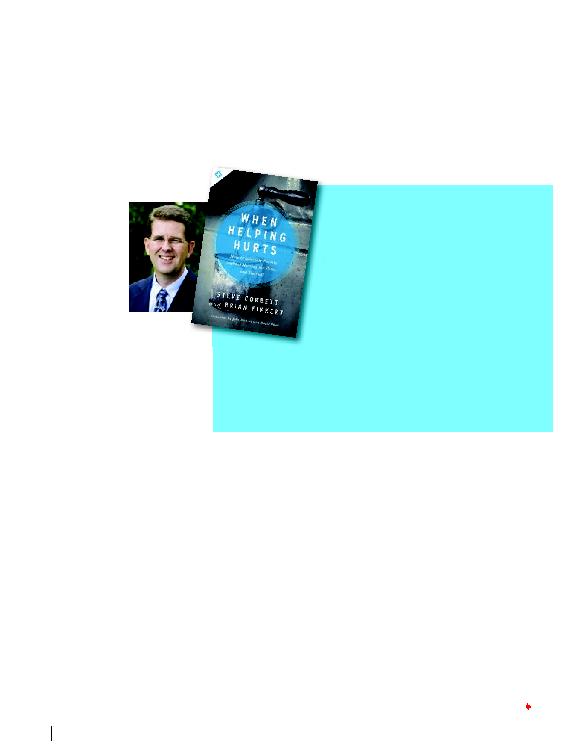
ness. In "helping" others we miss that we struggle with
pride, with feeling we have been anointed by God to
save other people. When people who are prideful inter-
act with people who feel shame, it is a really bad com-
bination. We take over and through our actions and our
words we communicate, "You are re-
ally helpless and you need me to fix
you." A need-based approach exacer-
bates that problem
because it basi-
cally says, "What
is wrong with you?
How can I fix you?"
with what is right.
It says to the low-
income individu-
als or community, "What gifts
and abilities has God given to you?
What resources do you have?" It walks
that person or community through a
process of listing their gifts. Gifts can
be spiritual, social, physical. They
can be associations or businesses in
a community, the gift of family, or
personal gifts. After getting people
to understand what those gifts are you then ask, "What
are your dreams? How can you use these gifts to achieve
the dreams?" Eventually you ask what the obstacles
are, what will prevent you from achieving your goals
with your own assets. Those are things you might want
to provide from the outside, the needs that need to be
addressed. Whatever you are providing from the out-
side should not undermine their use of their own gifts.
structive behaviors. The poor need to repent as part of
their own process of healing and restoration. But what
is surprising is that those who are materially better off
also need to repent. There are two sins that are deadly
to our work with the poor. The first one is to have pride
and superiority. We often think that we are kind of self-
made, that we pulled ourselves up by our own boot-
straps. We have a sense of accomplishment, that we are
ful as we work with the materially poor. They have a
sense of shame. When people with a sense of pride mix
with people who have a sense of shame, it's a bad com-
bination. We speak down to them, take over, try to con-
trol, confirming in them what they already feel. The
other is materialism, not just things like televisions
tic way, seeing the world as a big machine. It is to not
believe that spiritual forces do intervene in the world.
All this leads to approaches to the poor by looking for
material, natural solutions for things. If we dig this well
or if we make this vaccine available, build a house for
somebody or give them money,we have solved the prob-
lem. But the Bible speaks of human beings and indeed
the entire universe as having a spiritual component.
In fact in Colossians 1 Paul describes Jesus Christ as
the Creator and Sustainer and Reconciler of the en-
tire universe. He is touching it, He is holding it in the
palm of His hand and He is doing something to it. The
biblical model is that human beings and the cosmos
as a whole are open to Him. We are spiritual in na-
ture. That changes everything. It changes how we view
our everyday life. Suddenly prayer is essential, pray-
ing to God, believing He is actually doing something. It
changes how we work with the poor. It is not just about
stuff. It is about a spirituality and relationship. It is
a different understanding of how the world works.